
Justin: All right, Charles. So, The Curse—the Nathan Fielder–Benny Safdie–Emma Stone cringe comedy (??) series on Paramount+ With Showtime (??)—wrapped this weekend with its finale, “Green Queen.” The show was a confounding 10-week journey that touched on everything from gentrification to art vs. commerce to grappling with one’s sense of identity to, uh, cherry tomatoes. But nothing was as confounding as the final installment, which (MASSIVE SPOILERS TO FOLLOW) saw Whitney and Asher Siegel’s HGTV show—sorry, HGTV Go show—finally go live, Asher gift Abshir the house he’d been letting Abshir and his daughters live in (I’m not crying; it’s just dust), and a suddenly very pregnant Whitney consider what her fate will be after giving birth to a mini Asher. (Kid’s gonna need that dream catcher to protect him from this nightmare life.)
But the most perplexing—and the most divisive—part of the episode was the back half. That’s when Fielder’s Asher woke up on the ceiling of their newly HVAC’d passive home just as Stone’s Whitney was going into labor. After struggling with anti-gravity and a Dyson vacuum (could’ve used the crevice attachment), Whitney and Asher made it to the outside of the climate-controlled house of horrors. That’s when Asher was sucked first into a tree, then straight off this planet. Seriously, he was floating in space in the fetal position like Kubrick’s Moon Child. Meanwhile, Whitney made her way to the hospital to give birth to Baby Siegel—smiling the whole time, unaware of what was happening to Asher, but also possibly thrilled he may be gone forever. (And I haven’t even gotten to Dougie! Poor Dougie! Let my breathalyzer-blowing king live without constantly getting retraumatized!!)

I watched the episode late Friday. I spent early Saturday on Reddit and reading blogs on Slate and IndieWire, trying to figure out what the hell I just watched—and how the hell The Ringer could cover it. (Aside from Sean Fennessey and Joanna Robinson’s excellent breakdown on The Prestige TV Podcast.) I was deep into reading Hebrew scripture when you texted me an idea for a blog. This blog. Would you care to explain the idea?
Charles: For sure. Home alone on a Friday night with no plans, I was stuck between two decisions: visit my local watering hole to connect with the best and brightest of East Los Angeles, or have a quiet night in. Naturally, I did what any 31-year-old male would: I ordered tacos and watched a Nathan Fielder show.
Unfortunately, I also decided to get high on some terrible caffeine- and B12-infused gummies. [Editor’s note: Charles lives in the great state of California, where he is free to ingest all the weed and cannabinoids he’d like—responsibly, of course.]
Let me tell you, the vibe in my apartment couldn’t have been more terrible. I did not sign up to watch Nathan Fielder pop a blood vessel and terrify Bella from Poor Things. Thankfully, the terrible weed gummies hit right at the moment Nathan Fielder woke up on that ceiling and I thought I was witnessing the greatest piece of art of the 21st century.
I’ve since come down from the take and that high, but am sadly left with a Notes app page full of theories I made at 3 a.m. And now I’m here on a Saturday afternoon, writing to you.
Justin: So, first: It’s not often you can text your editor, say, “I came up with a great idea while high as shit,” and have them take you seriously, but if ever there was a show for this, it’s The Curse. Second: I watched the finale stone sober, but I sure as hell felt high when the episode opened with Rachael Ray and Salvatore “Big Pussy” Bonpensiero cooking meatballs. (Should’ve known we were headed toward an ambiguous ending when a Sopranos alum showed up.)
But, third, and maybe most importantly, I have a question: Are you high right now?
Charles: Yes. I can tell, because my cat is staring at me and I’m sad about the barrier between us.
But I figured it was best to be in the same state of mind as I was when I wrote these Notes app theories. I’ll do my best to explain them to you without seeming like I’ve joined Asher in the great metatextual beyond.
Justin: And, just to clarify for the surely confused reader: You’re going to toss out your most outlandish theories, and then I’m going to decide whether they work or whether I’m gonna yell at you like Cara for taking a piece of me. I’m wondering, should we use some sort of scoring system?
Charles: I’m on the A24 website as we speak, adding two $60 Cherry Tomato Boys tees into the cart and charging it to the company card. So in that spirit, I would like to be graded on a 1 to 10 cherry tomato scale.
Justin: Given Benny Safdie’s love of the Rotten Tomatoes rating system, I’m all for the Cherry Tomatometer. Let’s see what theories you’re packing. What’s up first?

Theory #1: Asher Becomes the Curse, and the Curse Is Lifted
Charles: In the penultimate episode, Asher has the type of aggressive, messianic break with reality that can be achieved by only a Z-list HGTV star constantly ridiculed for his micropenis.
In the aftermath of watching the original cut Whitney and Dougie sent to HGTV—the most brutal and emotional cucking of the season—Asher delivers an emotional plea to his wife. It’s here that Fielder forecasts the three most important events that will transpire in the finale:
- “There’s not some curse. I am the problem. It’s not magic. It’s me.”
- “I’m all in on Whitney. Whatever it takes, I’ll do it … I won’t be guessing, because I know you.”
- “If you don’t want to be with me and I actually truly felt that, I’d be gone. You wouldn’t have to say it. I would feel it, and I would disappear.”
At this moment, Asher becomes “the curse” in the most literal context, and curses exist to be lifted.
For nine episodes, Asher convinces himself through a combination of ignorance and racism that the root of all his problems is a young Somali girl performing magic on him. But by season’s end, Asher effectively becomes the thing he was running from all along. He embraces the fact that he’s as evil as Whitney and Dougie keep telling him he is. By accepting this version of himself—the court jester that’s filmed, cut, and broadcast by the two people closest to him—he’s freed.
While Whitney still believes she’s not a slumlord like her parents and Dougie is still in denial about his role in his wife’s death, Asher has no qualms about what he represents. He’s ready to gentrify an entire town and bulldoze their culture for the sake of keeping his marriage to Whitney alive. The Siegel family, with him as patriarch, is the plague ruining Española.
Like a neoliberal Jesus Christ, Asher accepts Whitney’s worldview completely and sacrifices himself for the sake of her endless girl-boss ambitions. “I won’t be guessing, because I know you” is an admittance on Asher’s part not only that he understands the slumlord daughter raised to believe in nothing, but that he’s morally fine with continuing her fantasy no matter the cost. The star of Fliplanthropy pulls off the most important flip of all … the one on himself.
The ultimate cuckold finally attains spiritual enlightenment.
So far, am I cooking?
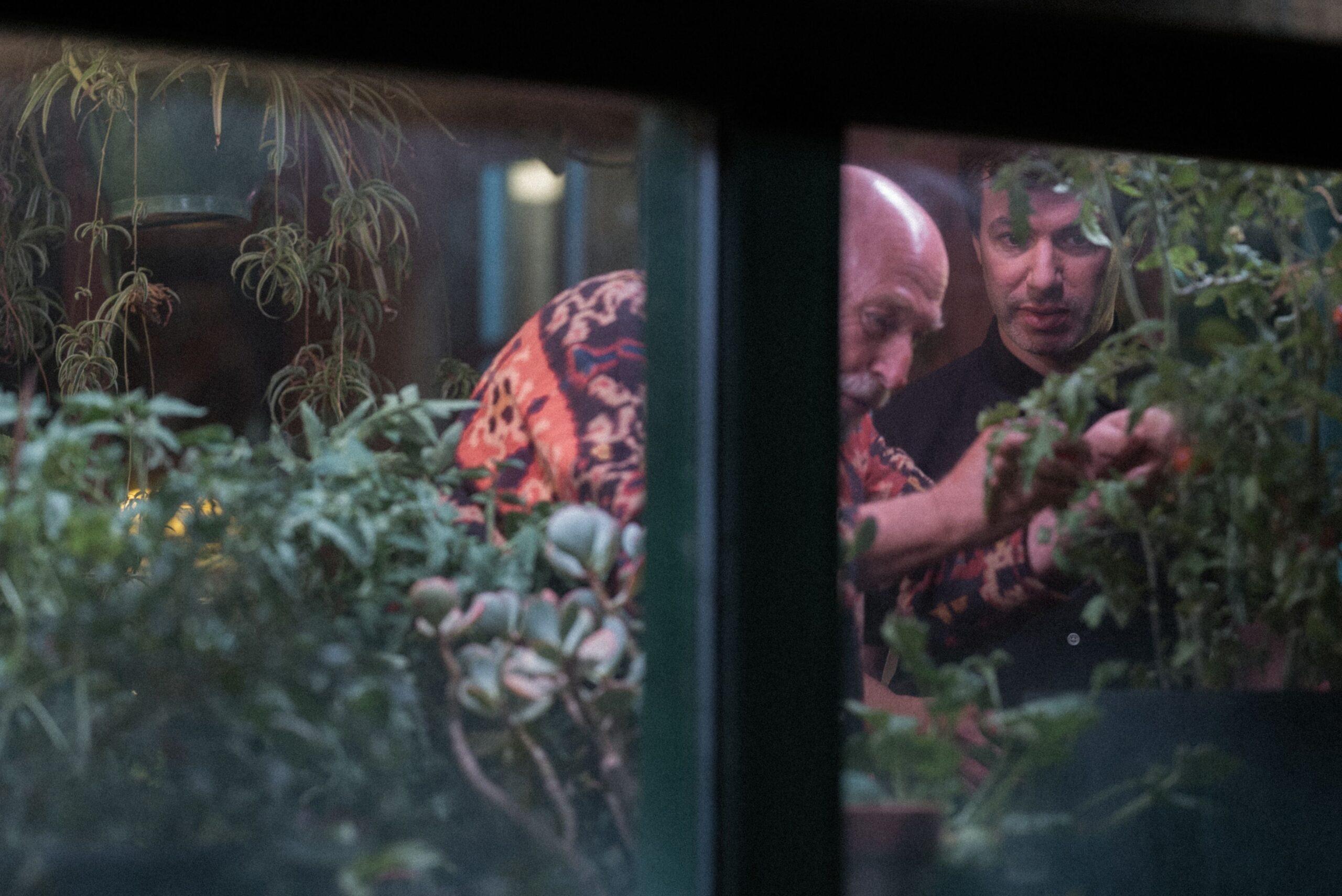
Justin: I’m not totally sold that Asher himself is the curse. Don’t get me wrong—Asher is not a good dude. (Like, just look at his role in the casino scandal.) But he’s hardly the darkest pit of blackness in the greater Española area. (That honor obviously goes to Whitney, who made a literal Holocaust joke at a Shabbat dinner.) I’m more of the belief that one of the curses—either Dougie’s or Nala’s, or maybe a secret one from Whitney when Asher was singing to her belly—finally took hold.
That said, I do appreciate the literalness of him being lifted, so it works on that level, and I’m enjoying this exercise so far.
Cherry Tomato Rank: 5 out of 10

Theory #2: Whitney Gives Birth to Her Reincarnated Husband
Charles: OK, so before I explain how Asher is reborn into the stomach of his pregnant wife, I need to explain why he’s on the ceiling of their passive home. It’s not a coincidence that Asher finds himself levitating on the day of his son’s birth in the finale.
An episode prior, Whitney realizes that the Green Queen is nothing without its jester when Dougie informs her that the network hated the #DivorceCut. When Whitney tries to wriggle out of being tied down to Asher indefinitely, she brings up the fact that a lot of reality stars get separated: “Those couples, they were together for a very long period of time,” Dougie responds. “They become beloved to the audiences, and then something happened. So people can pick sides. There’s a drama, you know? But if you have a show where two people hate each other from the beginning, that doesn’t really work, right?”
Dougie’s comments are meta in a couple of ways. It could be about the recent dissolution of the Safdie Brothers directing partnership, or about the struggles of selling a show revolving around a couple who can’t stand each other. But the most basic interpretation is that Whitney’s survival as a reality star and white woman in this world is tied to Asher.
Justin: Charles, you gotta get on with this one before I break out the chainsaw …
Charles: As the HGTV exec tells the couple at dinner, “Kids and homes, the viewers just trust you more.”
It’s at this moment that Whitney’s out becomes clear. She and Asher need to have a child. It gives the married couple the one thing they can’t fake or buy, relatability, and a potential ratings bump. But once Whitney gives birth, she doesn’t need her husband; and as we remember what Asher said:
“If you don’t want to be with me and I actually truly felt that, I’d be gone. You wouldn’t have to say it. I would feel it, and I would disappear.”
When Whitney finally has the baby, we’re treated to an extended scene where she’s overcome with an ecstasy and joy that escaped her throughout the series. She has finally created something more important than her “art.” She doesn’t need to explain her maternal and metaphysical happiness to the audience or Asher. It’s evident. And thus Asher disappears into the stratosphere as he promised, fulfilling his final pact and curse.
It’s basically the end of 2001: A Space Odyssey or Neon Genesis Evangelion. And I’m assuming you’re up on your Evangelion lore, Sayles?
Justin: I was just about to start it before you spoiled it for me, I swear. But tell me about it.
Charles: Essentially, it’s a mecha anime about a Japanese boy who has to save the world by using the robot womb of his mother, while also fighting his hormonal urges for two girl robot pilots (one of them is a clone of his mom).
Justin: I have questions that I don’t necessarily want answers to.
Charles: Well, I bring up Evangelion because it reminded me of the Oedipal undertones of this series. Asher is a man-child, and Whitney is his put-upon mother. The finale makes a point of stressing that the Siegels’ new child is a son, the most impactful way to demonstrate that Whitney is destined to continue this long line of small-dick white men ravaging the world.
The scene of Asher being freed from the tree and flying into the sky is interspersed with his wife giving birth. As Asher says in the penultimate episode, the couple are paper and rock, and their baby becomes the scissors of the equation. While Asher flies higher into the air, Whitney complains in the hospital room that she’s cold and “all alone up here.” For the first time in the series, the couple are truly one and experiencing the same reality.
The last words we hear from Asher are “If I come back down”—and then the Siegels’ son is born.
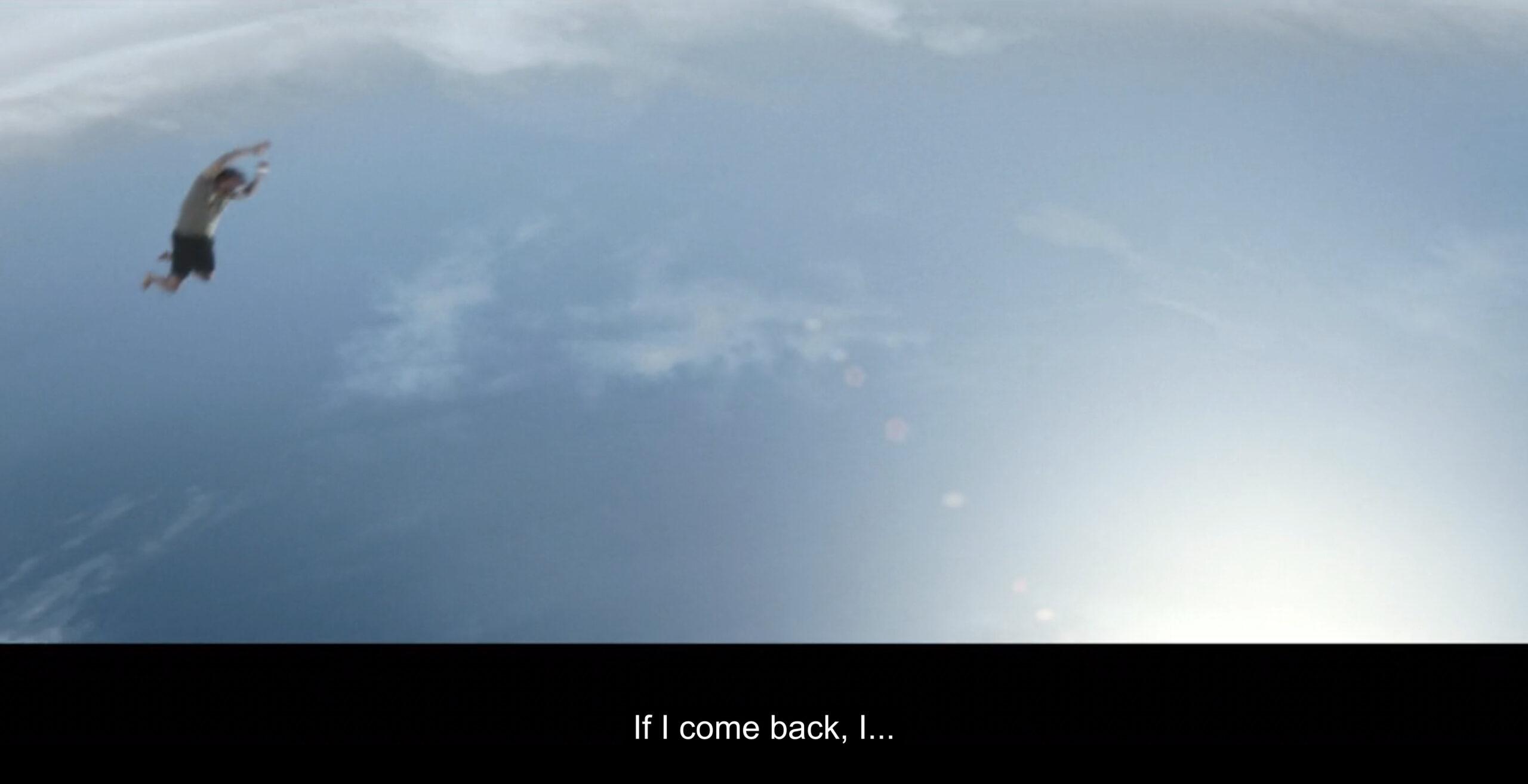
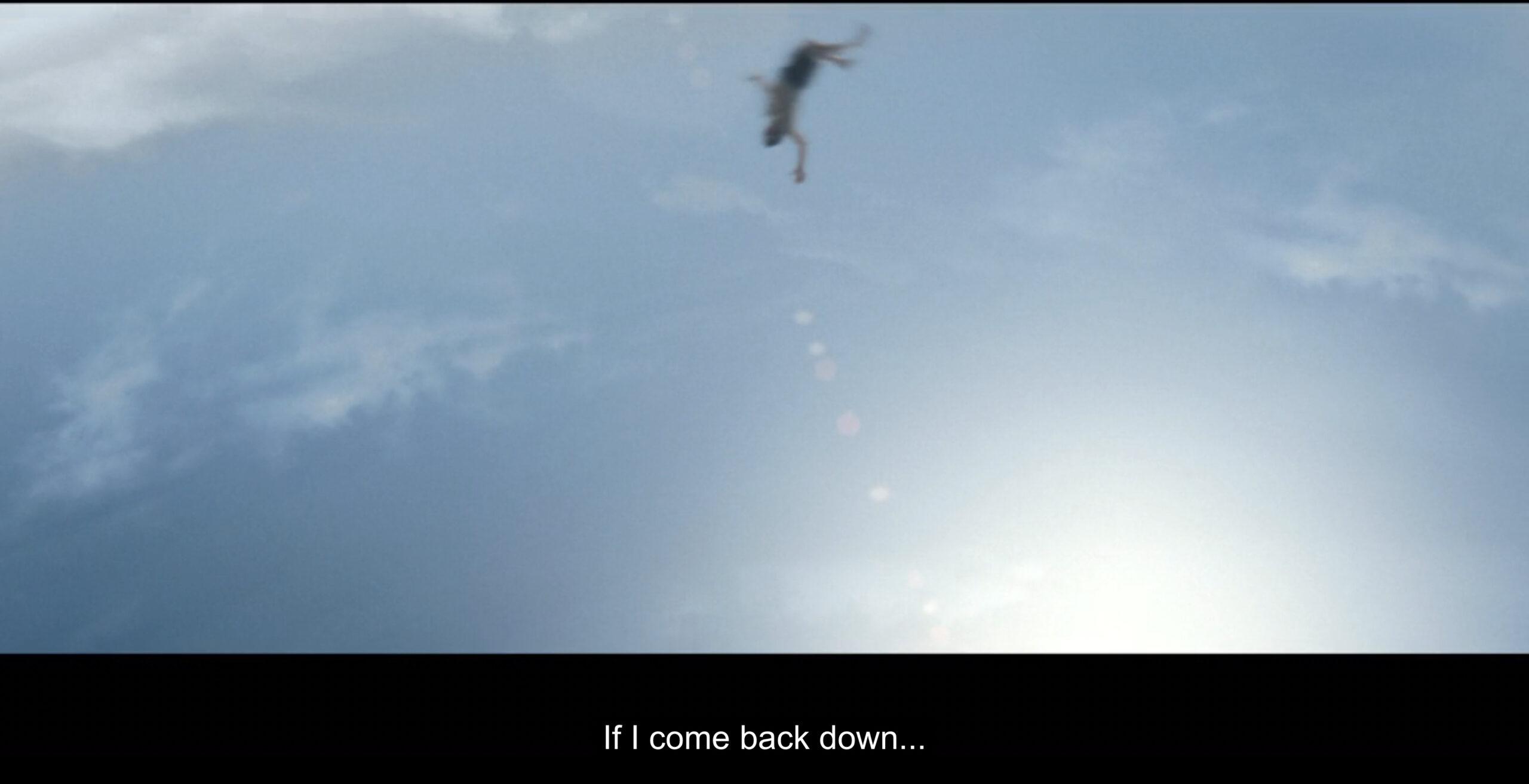
Admit it. Your mind is blown.
Justin: I started out very skeptical about this one. But then I went back and watched some of the cuts between Asher’s ascent and Whitney giving birth, and let me say, it lines up perfectly. Like, look at this cut between Asher’s failed saw-down and Whitney’s C-section:
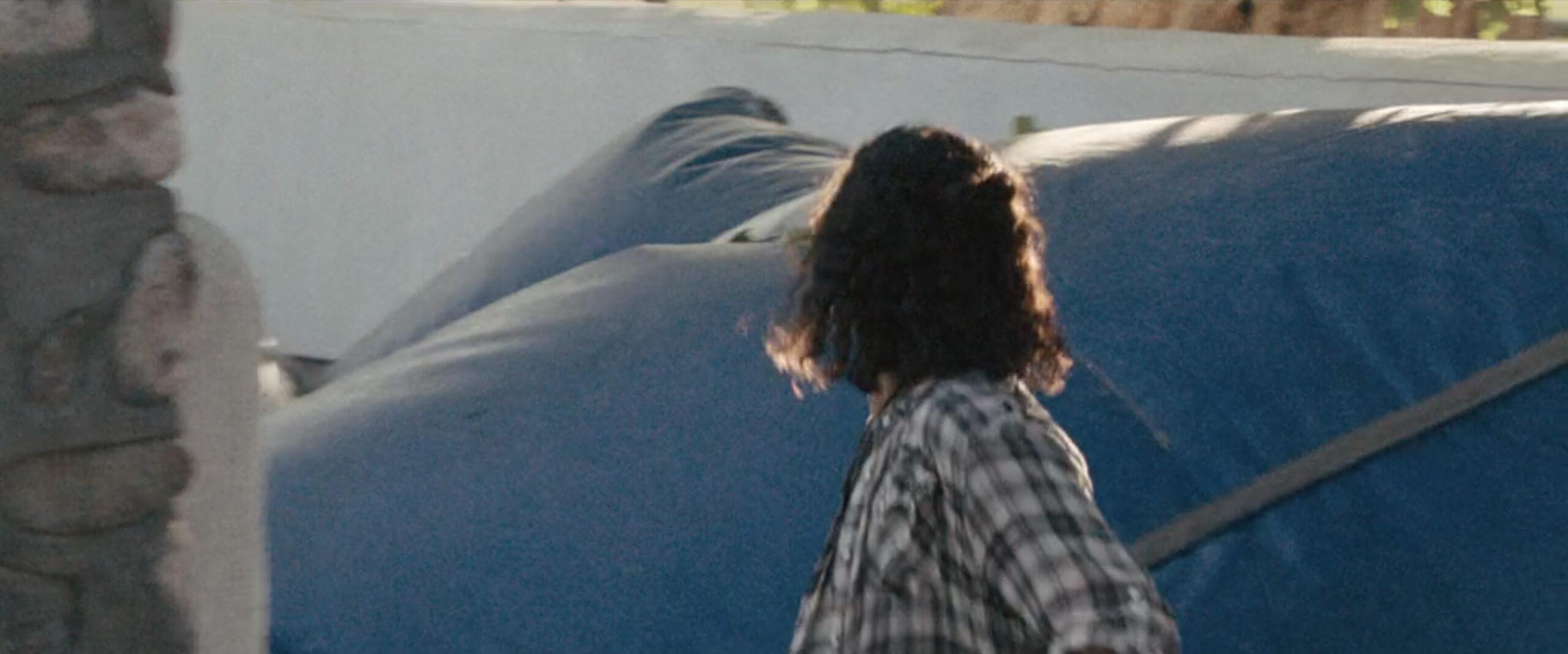
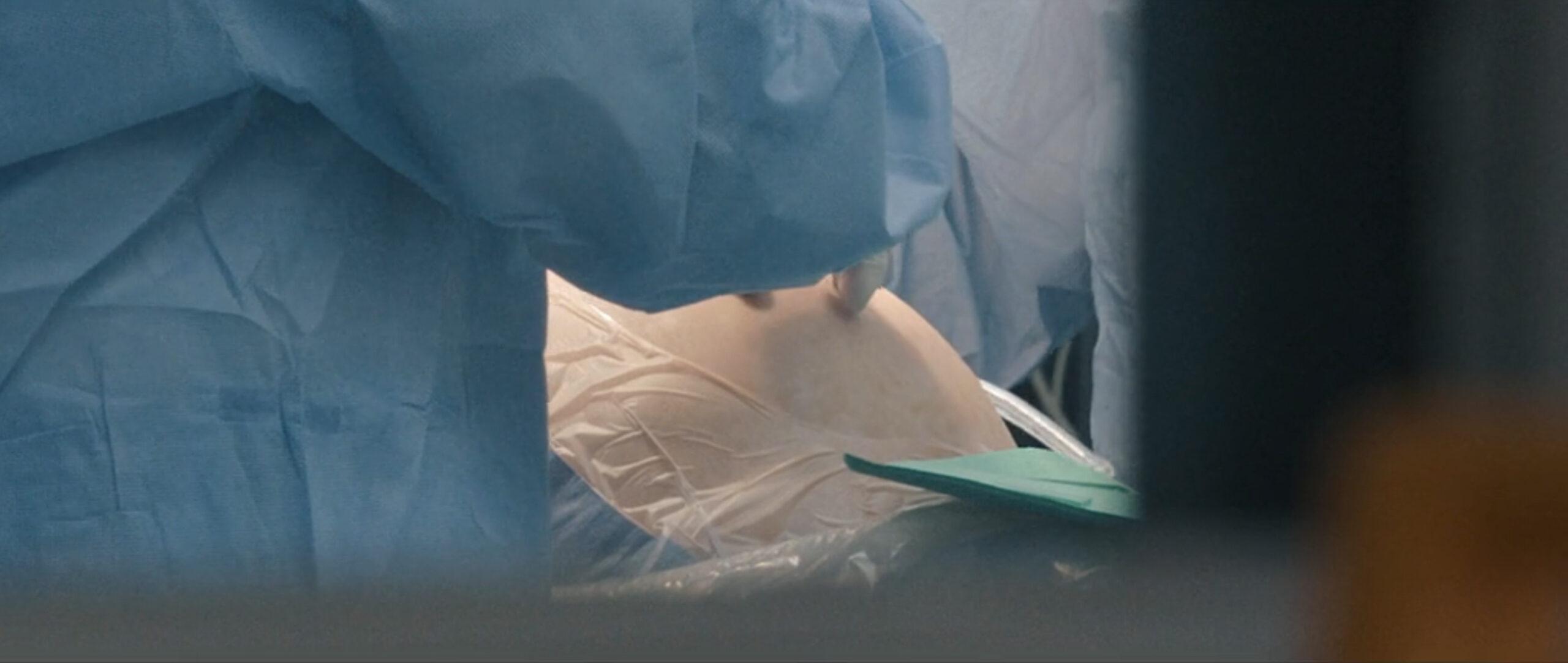
Add in the comments Asher made about there being another him inside Whitney’s belly—plus the nightmare fuel from the end of the comedy class episode, when Asher made that horrifying baby face—and I’m in. Asher is the baby. Let’s go.
The only reason I’m not going higher (no pun intended) with the score is because you have two theories left, and I’m assuming you’re gonna land on something truly galaxy-brained (pun intended).
Cherry Tomato Rank: 8.5 out of 10

Theory #3: Asher Is a Cat
Charles: How familiar are you with the screenwriting book Save the Cat! by Blake Snyder?
Justin: Very, actually. I just finished writing and hosting a narrative podcast named The Wedding Scammer (cheap plug). When I started the process, I wasn’t sure I knew how to structure something episodically, so I bought this book, read it, and then ultimately decided no podcaster was ever saving anyone or anything. But could you explain it for the readers out there not trying to make it in Hollywood?
Charles: It’s the type of book every 19-year-old aspiring screenwriter read at Starbucks in the mid-2000s. Snyder breaks down a rote formula on how most movies work. The main thesis of Save the Cat! is that your protagonist must do something early in a script that will quickly get the audience to their side, à la saving a cat from a tree.
The entire inciting incident of the pilot revolves around this idea. When Dougie asks Asher to give Nala money in the parking lot, he’s trying to make the ineffective and unlikable costar of the show into a likable hero. But Asher is so cheap, dumb, and ineffectual that he can’t help but fail. The moment the cameras stop rolling, Asher snatches the money away from Nala, underlining the moral depravity of the character. He’s the cat and pussy of this story.
Asher is a selfish creature, a pet driven on instinct, who thinks himself the master of his domain because others are forced to scoop his shit. In essence, he’s your stereotypical white man.
Also, at the end of Episode 8, Asher finally confronts Dougie about the drunk-driving incident involving his wife. Before the night ends, Dougie curses Asher for breaking his carefully curated reality. When he drives away, an orange cat walks into the frame, lingering right outside the Siegel home and under the tree that Asher will be stuck in during the finale.
Justin: Sounds like you really do have a complicated relationship with your cat. (Say hi to Sushi for me.) I will admit, Nathan Fielder does like cats. (And even Cats.) But cats land on their feet, not Jupiter. Also, I will now drop in this screenshot of the texts you just sent me.

This is the good shit. I mean, it’s an absurd theory. But it’s the good shit.
Cherry Tomato Rank: 4 out of 10

Theory #4: This Was All the Matrix
Charles: All right, I’m going to keep this brief because I’m growing tired and hungry. This was all a Matrix similar to 1999’s The Matrix. When Whitney goes to visit her parents for the last time in the show, her father says something peculiar: “The matrix is getting very, very lazy.”
Whitney basically becomes this universe’s Neo. Asher sacrifices his humanity to empower his wife with delusions of grandeur. With her new strength, she uses her powers of gentrification to turn Española into a pocket reality—and within this universe, Whitney can place a curse on Asher that’s so potent it flings him into outer space. Also, there’s some Virgin Mary iconography going on, but I ain’t getting into all of that now. How did I do?

Justin: Charles, maybe you actually should not text your editor “I came up with a great idea while high as shit.” I respect the sheer audacity of your Gentrification Keanu theory, but maybe this one should’ve stayed in the pants.
Cherry Tomato Rank: 1 out of 10 (one for Neo, naturally)

Justin: But actually, I’ve got something important I want to discuss …
Bonus Round: Did the Finale Work for You?
Justin: By the end of the series, the running joke was there weren’t many people still watching The Curse, but the ones who hung around were obsessed. Charles, I believe that despite also being part of the growing Men for Fielder tribe, you were roughly where I was: skeptical, but willing to stick around to see whether they could stick the landing. (The irony of that phrase, given the ending we got.) But after all, Fielder had done it with Nathan for You and The Rehearsal, when he had no business doing so.
I’m so used to seeing Fielder do reality-ish (surreality?) TV that seeing him in a scripted format is a bit jarring. In the middle parts of the season, I wondered whether the slow-burn cringe was worth it. The show was exploring some interesting ideas—self-styled white saviors and transactional relationships, among other things—but I worried it was taking a long road to get where it was going.
It felt like the embodiment of Asher’s comments about how The Producers handled the Holocaust: “We thought it was a sad thing, and it is a sad thing, but it’s also funny, too. Or there’s humor that could be found in it. Because art is about … really, art is about, um … sometimes you have to go to extreme lengths to make your point.” These were extremely extreme lengths. But when Asher woke up levitating that morning, it made it all feel worth it, even if we’re still trying to work through what it meant. “Green Queen” was probably the most surreal hour of television since “Part 18” of Twin Peaks: The Return. (Though let me be clear: While The Curse earned the right to be labeled the most cliché of all storytelling adjectives—Lynchian, Kafkaesque—it was not The Return. We also may need some new reference points, if I’m being real. I’ll back off that take if Asher comes back in 25 years.)
I saw some people say it was the most harrowing and thought-provoking hour of TV they’ve ever watched. That honor actually belongs to Love to the Third Degree, but The Curse finale did send me to Reddit for a few hours today. Also, it was maybe the perfect distillation of the existential cringe Fielder has been working toward in his art. I’m fascinated to see what he does next as a director. (And between this and Poor Things, allow me to add to the chorus of elder millennial white men and say: Emma Stone is our best working actress. She can play a literal monster learning about the world, like she did in Yorgos Lanthimos’s latest fantasy dramedy, and then easily slide into playing a figurative—if bigger—monster destroying the world around her as Whitney in The Curse. She’s charming either way. She’s my Green Queen, forever.)
All that said, I’m giving The Curse a solid 7 on the Cherry Tomatometer. It was a long, tiring, twisted journey—one I’m glad I took but not sure I’d take again. It was often more fun to talk about than to watch, as evidenced by this discussion.
How about you, Charles? What are you giving it? You ready to shoplift some jeans and live in a reflective Stanley cup?
Charles: This is why you’re the guy who gets the “let’s blog about The Curse” text. I fall exactly where you do. The Curse struggled to be entertaining even as it grew more fascinating. The more political aspects of the show never found their footing. Often the tense and cringe humor felt more entertaining to conceive and execute on than it was to watch.
But I still find myself feeling fond about where the show landed. Fielder and Safdie bet big that the audacious punchline would make the preceding nine and a half hours worth it. Only time and distance will tell whether that was the correct gambit.
I’m giving this 7.5 cherry toms.
Justin: Actually, Charles—now that I’m thinking of this and the Fielder and Safdie of it all, let me propose one theory of my own …
Justin’s Theory: They Were Just Fucking With Us ... Maybe
Justin: Forget Kafkaesque. Let me toss out another cliché adjective that may fit better here: Kaufmanesque. Obviously the show had a lot it wanted to say, but to throw it all away in the final 40 minutes and shoot Nathan into space—knowing people like you and I were gonna spend hours theorizing about a possibly pointless bit? Sounds like Andy Kaufman by way of Charlie Kaufman to me.
What say you, Charles?
Charles: If the finale is a troll, I still find the destination satisfying (even if the journey was mired in prestige bloat). Watching TV critics contort themselves into knots trying to figure out which crazy white boys—Kafka, Kaufman, or Lynch—are closest to our A24 caucasians is worth the price of admission.
The mark of a good finale is that it can work in multiple ways. Fielder flying off into space can be as ridiculous, ambiguous, or Reddit-pilled as you want it to be. All the explanations make sense, because ultimately none of them do. Some artwork needs America Ferrera delivering a Feminism 101 speech to ensure no one walks away confused, and others end with Emma Stone birthing the Nathan for You Antichrist.
Justin: I’m always hungry for nothing, but only if Nathan’s serving it. I guess I have no choice but to shrug and quote the confused onlooker who closed out The Curse: “So it’s for TV? … Huh.” Sometimes, it’s that simple. And sometimes, the simple stuff leaves you saying huh.
Good job, Charles. Now never blog high again.
